 Update: Full Report now attached inside this article."[...]There is an insufficient amount of publicly available information about agreements under negotiation, and independently sourced economic analyses of their likely benefits are not mandatory. In relation to the TPP, this has fuelled media speculation on the content of the agreement when certainty based on fact is required. It is unsatisfactory for complex trade agreements, which are years in the making, to be negotiated in secret and subject to stakeholder and parliamentary scrutiny for a few short months with no realistic capacity for text to be changed, and then for implementation of the legislation to be rushed through parliament unamended. This comes very close to making a mockery of the process and of parliament's involvement." (Alex Gallacher, SA, Australian Labor Party, Senate debates, Thursday, 25 June 2015, Foreign Affairs, Defence and Trade References Committee; Report [1])
Update: Full Report now attached inside this article."[...]There is an insufficient amount of publicly available information about agreements under negotiation, and independently sourced economic analyses of their likely benefits are not mandatory. In relation to the TPP, this has fuelled media speculation on the content of the agreement when certainty based on fact is required. It is unsatisfactory for complex trade agreements, which are years in the making, to be negotiated in secret and subject to stakeholder and parliamentary scrutiny for a few short months with no realistic capacity for text to be changed, and then for implementation of the legislation to be rushed through parliament unamended. This comes very close to making a mockery of the process and of parliament's involvement." (Alex Gallacher, SA, Australian Labor Party, Senate debates, Thursday, 25 June 2015, Foreign Affairs, Defence and Trade References Committee; Report [1])
I present the report of the Foreign Affairs, Defence and Trade References Committee on the Commonwealth's treaty-making process, together with a Hansard record of proceedings, documents presented to the committee. [...]
I am pleased to table this report of the Foreign Affairs, Defence and Trade References committee into Australia's treaty-making process. The timing of this report could not have been better. Only last week, the China-Australia Free Trade Agreement was signed, tabled in the Australian Parliament and referred to the Joint Standing Committee on Treaties, for inquiry and report within 20 joint-sitting days, consistent with the process that has been in place for two decades. The Trans-Pacific Partnership is also entering its final stages of negotiations, with parliamentarians told recently they could access the draft text, but only after signing a confidentiality agreement.
ChAFTA and the TPP have thrown into sharp relief evidence received by the committee from industry bodies, the union movement, academic experts and other stakeholders that the treaty-making process is in need of reform.
During the committee's hearing the Department of Foreign Affairs and Trade, DFAT, which is responsible for negotiating, consulting and finalising free trade agreements, was a lone voice in supporting the status quo. All of the 95 submissions received by the committee and every witness appearing before it over two days of hearings, with the exception of the department, argued that the current treaty-making process falls short on a number of counts.
First and foremost, all treaties, especially complex free trade agreements, are presented to the parliament and subject to scrutiny only after they are signed by the government. That parliament is faced with an all-or-nothing choice when considering legislation to bring an agreement into force prevents it from pursuing a key scrutiny and accountability responsibility. It is no longer satisfactory for parliamentarians and other stakeholders to be kept in the dark during negotiations when Australia's trading partners, including their industry stakeholders, have access under long-established and sensible arrangements.
Second, it is pointless for JSCOT to conduct its inquiries after the agreements are a done deal and signed by the government. This does not provide for an adequate level of oversight and scrutiny. Parliament should play a constructive role during negotiations and not merely rubber stamp agreements negotiated behind closed doors.
Third, the department's process of consultation is not working, contrary to what officers told the committee at a hearing. Meetings and briefings with stakeholders are plentiful but they are not as effective as they could be and fall way short of stakeholder expectations, adding to their frustration.
Finally, there is an insufficient amount of publicly available information about agreements under negotiation, and independently sourced economic analyses of their likely benefits are not mandatory. In relation to the TPP, this has fuelled media speculation on the content of the agreement when certainty based on fact is required. It is unsatisfactory for complex trade agreements, which are years in the making, to be negotiated in secret and subject to stakeholder and parliamentary scrutiny for a few short months with no realistic capacity for text to be changed, and then for implementation of the legislation to be rushed through parliament unamended. This comes very close to making a mockery of the process and of parliament's involvement.
In addressing these problems, this report steers a middle course between doing nothing, which appears to be the entrenched position of the coalition government, and recommending that treaties be subject to parliamentary approval, which is unlikely to garner political support any time soon.
The opposition favours incremental change building on the package of sensible reforms introduced by the government in 1996. This is why the report makes practical recommendations aimed at improving the level of transparency in negotiating treaties and the quality of consultations between DFAT and stakeholders, and making parliament a real player in treaty making.
Specifically, the report's key recommendations are: that the Joint Standing Committee on Treaties engage more in the oversight of trade agreements under negotiation and not wait until the end of the process; that parliamentarians and stakeholders be given access to treaty texts on a confidential basis during negotiations and not a token look at the end, as with the TPP; that trade agreements be subject to an independent cost-benefit analysis prepared up-front at the commencement of negotiations; and that a model agreement be developed as a template for all future agreements that deal with complex issues such as investor-state dispute settlement, intellectual property and copyright.
These are practical measures that improve stakeholder engagement during treaty negotiations and entrench democratic accountability through effective parliamentary scrutiny using the existing committee system These measures also better serve Australia's national interest by providing a more strategic and less reactive approach to treaty making.
The report's recommendations are consistent with the bipartisan approach of successive Australian governments to trade liberalisation, including the pursuit of free trade agreements. They do not question the constitutional parameters of treaty making or undermine the executive's authority to sign treaties or hinder the ability of the Australian government to implement free trade agreements in a timely fashion. The recommendations can be introduced quickly and without the need for legislation.
Put bluntly, the government has nothing to fear in supporting these measures. This report will lead to a better treaty-making process and, ultimately, better treaty outcomes for Australia in the future. Doing nothing is no longer an option. Treaty making in Australia faces a number of challenges which cannot be met by continuing with the existing process unchanged. These challenges include the changing nature of Australia's international obligations and their intrusion into domestic law and regulation; new methods of consultation and negotiation adopted in overseas jurisdictions resulting in less secrecy; and ensuring that DFAT is adequately resourced with the knowledge and skills to negotiate, conclude and review complex free trade agreements.
NOTES
[1] http://parlinfo.aph.gov.au/parlInfo/download/chamber/hansards/99c8aee1-aa1b-48da-8cdc-593fed2e4d62/toc_pdf/Senate_2015_06_25_3556.pdf;fileType=application%2Fpdf
[2] Thanks to OpenAustralia for its tracking capabilities and analysis of parliamentarian voting and other behaviour. For more on Alex Gallacher see http://www.openaustralia.org.au/senator/alex_gallacher/sa
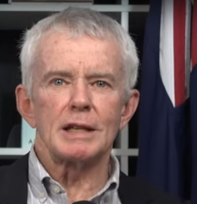 In the 3 minute video below, One Nation Senator Malcolm Roberts calls upon all patriotic Australians to attend the "Australia Unites" protests starting 12pm tomorrow, Saturday 13 September in all of our capital cities. I include further below "Watch how Pauline Hanson HUMILIATES Albanese & Labour MPs in Australia Parliament On LIVE TV!" Pauline Hansen rightly condemns the Albanese/Green government for driving up the cost of living and causing many Australians to become homeless as a consequence of their record high immigration. However this speech is somewhat marred by her condemnation of Australians protesting for Palestine. Whilst, last Sunday 31 March a group of provocateurs, claiming to be supporters of Palestine, attempted to stop the March for Australia, I don't believe they represent those Australians who support Palestine. Beneath Malcolm's video, I urged him to contact NSW Libertarian MLC, John Ruddick who attends protests for Palestine in addition to protests against high immigration.
In the 3 minute video below, One Nation Senator Malcolm Roberts calls upon all patriotic Australians to attend the "Australia Unites" protests starting 12pm tomorrow, Saturday 13 September in all of our capital cities. I include further below "Watch how Pauline Hanson HUMILIATES Albanese & Labour MPs in Australia Parliament On LIVE TV!" Pauline Hansen rightly condemns the Albanese/Green government for driving up the cost of living and causing many Australians to become homeless as a consequence of their record high immigration. However this speech is somewhat marred by her condemnation of Australians protesting for Palestine. Whilst, last Sunday 31 March a group of provocateurs, claiming to be supporters of Palestine, attempted to stop the March for Australia, I don't believe they represent those Australians who support Palestine. Beneath Malcolm's video, I urged him to contact NSW Libertarian MLC, John Ruddick who attends protests for Palestine in addition to protests against high immigration. 
 Today Australian Federal Parliament voted down Independent Senator David Pocock's motion to establish a Select Committee on Population Impacts to inquire into the effect of population growth and management in Australia. Pocock has a background in sustainable agriculture and sport. Consider lobbying your member of Federal Parliament to help him move the motion again.
Today Australian Federal Parliament voted down Independent Senator David Pocock's motion to establish a Select Committee on Population Impacts to inquire into the effect of population growth and management in Australia. Pocock has a background in sustainable agriculture and sport. Consider lobbying your member of Federal Parliament to help him move the motion again.

 House of Representatives (Australia) Monday, 18 March 2024. Chamber. Unfortunately this motion, of which you can read the detail and debate below, failed with 6 for and 63 against.
House of Representatives (Australia) Monday, 18 March 2024. Chamber. Unfortunately this motion, of which you can read the detail and debate below, failed with 6 for and 63 against.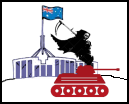 "Clear need to improve the transparency and accountability of government decision-making in relation to armed conflict.' "Require a written statement to be published and tabled in the Parliament setting out the objectives of major military operations, the orders made and legal basis"; "Facilitate debate ..."
"Clear need to improve the transparency and accountability of government decision-making in relation to armed conflict.' "Require a written statement to be published and tabled in the Parliament setting out the objectives of major military operations, the orders made and legal basis"; "Facilitate debate ..."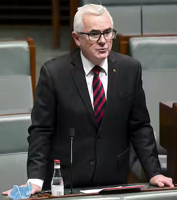 Included below is an example of the letters I sent late in the evening of Monday 27 March to each of the 40 members of the Bring Julian Assange Home Parliamentary Support Group. I point out that, in spite of its size, the efforts of this group so far appear to have made little difference towards making the Albanese government act to end the UK's illegal imprisonment of Assange or even to just hold this government to account for its failure to do so.
Included below is an example of the letters I sent late in the evening of Monday 27 March to each of the 40 members of the Bring Julian Assange Home Parliamentary Support Group. I point out that, in spite of its size, the efforts of this group so far appear to have made little difference towards making the Albanese government act to end the UK's illegal imprisonment of Assange or even to just hold this government to account for its failure to do so.
 The following Open Letter has been sent to all 40 members of the Bring Julian Assange Home Parliamentary Support Group (Julian Assange Parliamentary Support Group).
The following Open Letter has been sent to all 40 members of the Bring Julian Assange Home Parliamentary Support Group (Julian Assange Parliamentary Support Group). Engrossing discussion of the arcane and unfair legal and political web entrapping Julian Assange: Lee Camp's excellent questions allow Stella Assange to use her legal and personal experience to comment in depth on the political relationships and laws and legal systems involved, such as the post 9-11 terrorism extradition laws; Britain's unequal status in US-British extradition laws; the incompatibility of how freedom of the press as conceived in the US is not possible in Britain
Engrossing discussion of the arcane and unfair legal and political web entrapping Julian Assange: Lee Camp's excellent questions allow Stella Assange to use her legal and personal experience to comment in depth on the political relationships and laws and legal systems involved, such as the post 9-11 terrorism extradition laws; Britain's unequal status in US-British extradition laws; the incompatibility of how freedom of the press as conceived in the US is not possible in Britain 
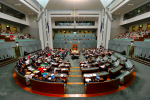 Next week, both the House and the Senate are sitting. We must demand that, this time, its gag on discussion about Julian Assange be lifted.
Next week, both the House and the Senate are sitting. We must demand that, this time, its gag on discussion about Julian Assange be lifted. At a protest for Julian Assange, which commenced outside the Victorian State Library at 12:00pm on Sunday 28 September, protestors demanded that the Australian government use the power vested in it as a sovereign national government to make British Prime Minister Liz Truss end the illegal imprisonment and torture of Julian Assange.
At a protest for Julian Assange, which commenced outside the Victorian State Library at 12:00pm on Sunday 28 September, protestors demanded that the Australian government use the power vested in it as a sovereign national government to make British Prime Minister Liz Truss end the illegal imprisonment and torture of Julian Assange.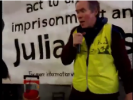 Australian Parliament, which sits next week from Monday 6 September, must be made, finally, to debate Julian Assange's fate. At the weekly vigil for Julian Assange outside Melbourne's Flinders Street Station in the evening of last Friday 26 August, James Sinnamon explained how, if Australian Prime Minister Anthony Albanese told the UK Prime Minister Boris Johnson to end its imprisonment of Julian Assange, he would almost certainly comply without delay, and Julian Assange would
Australian Parliament, which sits next week from Monday 6 September, must be made, finally, to debate Julian Assange's fate. At the weekly vigil for Julian Assange outside Melbourne's Flinders Street Station in the evening of last Friday 26 August, James Sinnamon explained how, if Australian Prime Minister Anthony Albanese told the UK Prime Minister Boris Johnson to end its imprisonment of Julian Assange, he would almost certainly comply without delay, and Julian Assange would 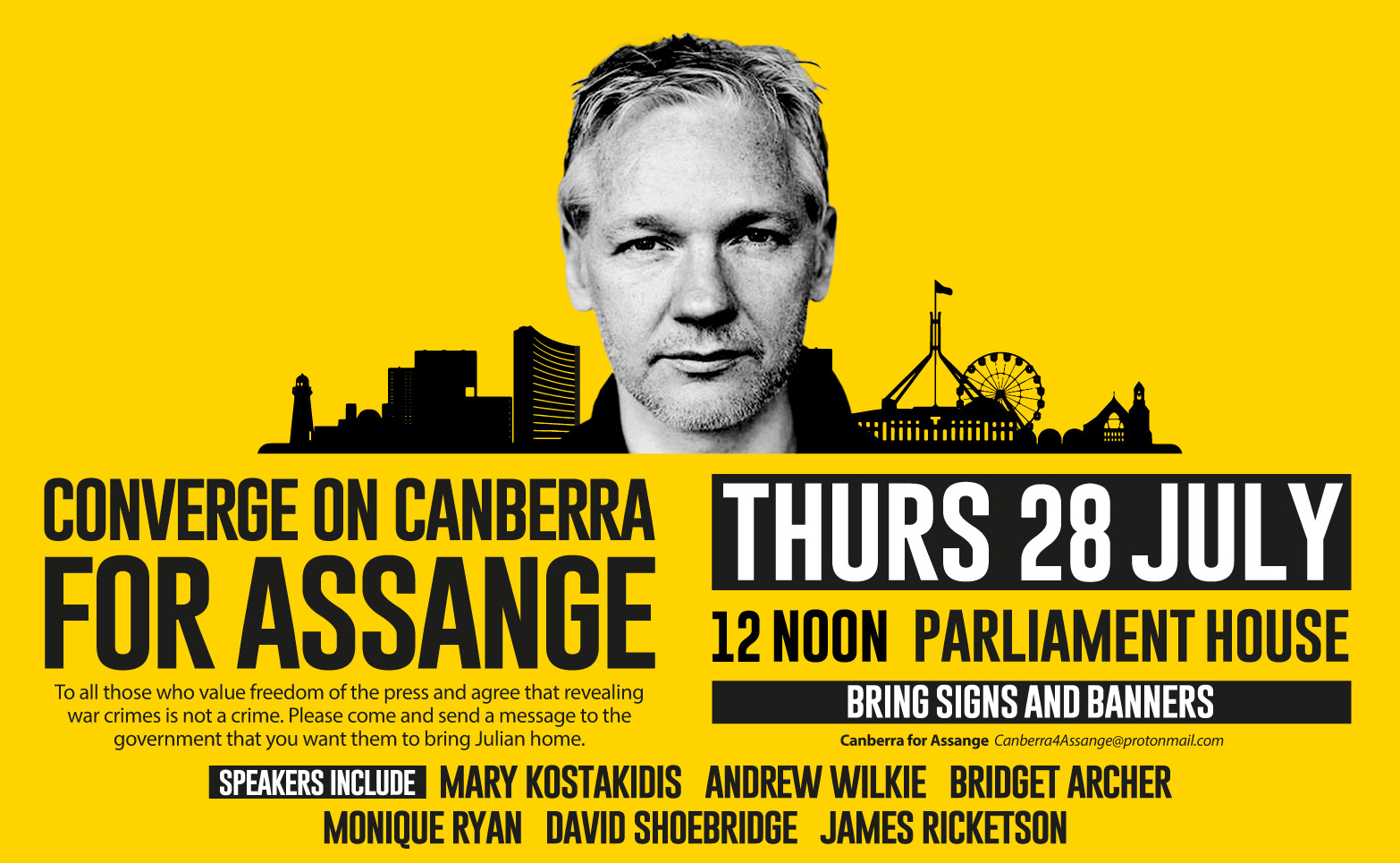
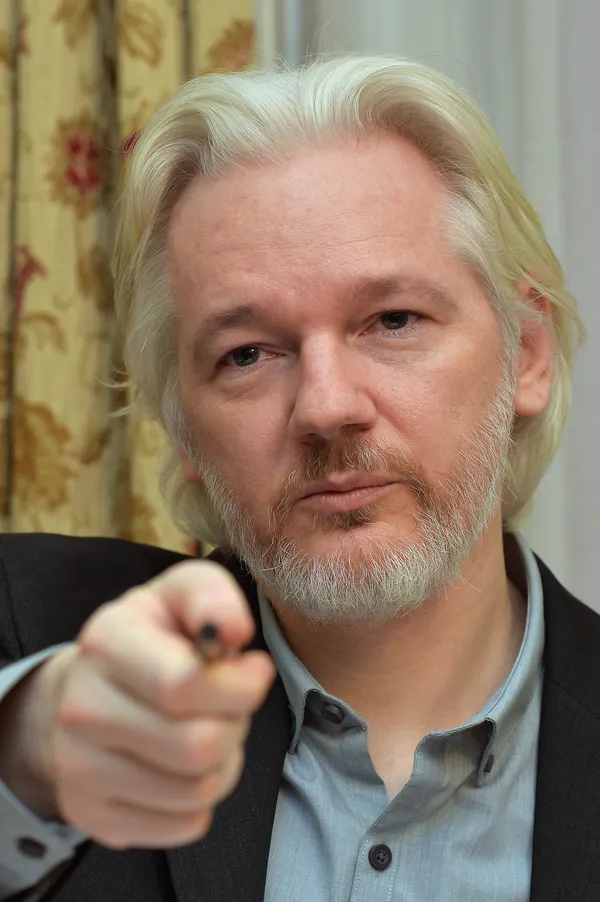

 New important initiative. Labor MP Julian Hill's private motion may finally force Australian parliamentarians to take sides for or against Julian Assange and lead to his being freed. Whether this motion is heard and debated depends on whether the House of Representatives Selection Committee allows it. We urge Australians to contact their local members and each other to get behind Mr Hill's motion, which calls for Assange to be set free from his illegal imprisonment, noting that he is the recipient of many awards for journalism, detained for political reasons through an abuse of power. If the motion is allowed through, then both sides of the house will be obliged to vote or abstain, and the Australian public will finally see what they are made of.
New important initiative. Labor MP Julian Hill's private motion may finally force Australian parliamentarians to take sides for or against Julian Assange and lead to his being freed. Whether this motion is heard and debated depends on whether the House of Representatives Selection Committee allows it. We urge Australians to contact their local members and each other to get behind Mr Hill's motion, which calls for Assange to be set free from his illegal imprisonment, noting that he is the recipient of many awards for journalism, detained for political reasons through an abuse of power. If the motion is allowed through, then both sides of the house will be obliged to vote or abstain, and the Australian public will finally see what they are made of.
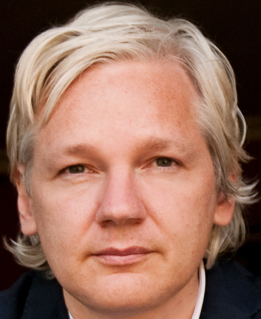
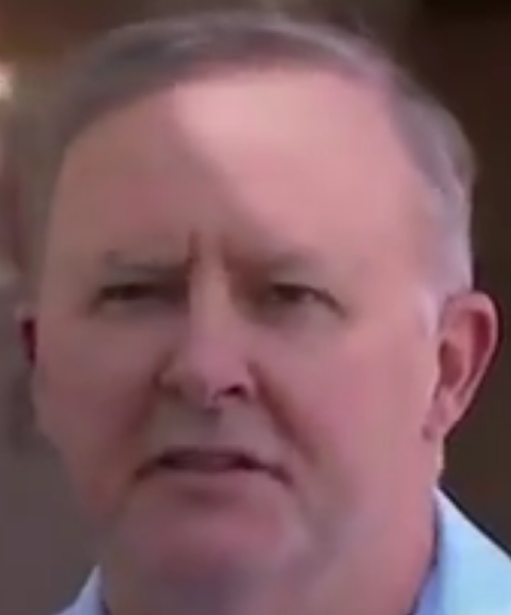
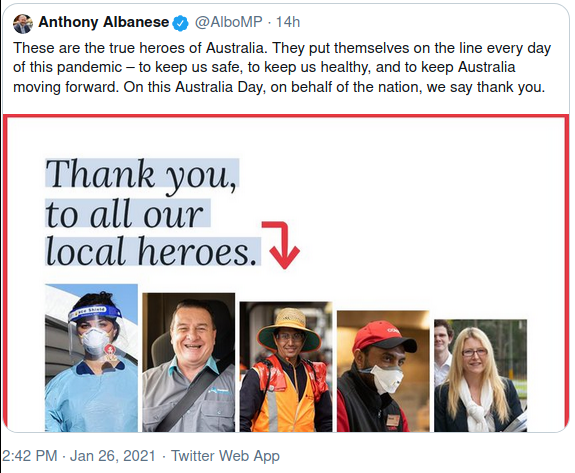
 Update: Full Report now attached inside this article."[...]There is an insufficient amount of publicly available information about agreements under negotiation, and independently sourced economic analyses of their likely benefits are not mandatory. In relation to the TPP, this has fuelled media speculation on the content of the agreement when certainty based on fact is required. It is unsatisfactory for complex trade agreements, which are years in the making, to be negotiated in secret and subject to stakeholder and parliamentary scrutiny for a few short months with no realistic capacity for text to be changed, and then for implementation of the legislation to be rushed through parliament unamended. This comes very close to making a mockery of the process and of parliament's involvement." (Alex Gallacher, SA, Australian Labor Party, Senate debates, Thursday, 25 June 2015, Foreign Affairs, Defence and Trade References Committee; Report [1])
Update: Full Report now attached inside this article."[...]There is an insufficient amount of publicly available information about agreements under negotiation, and independently sourced economic analyses of their likely benefits are not mandatory. In relation to the TPP, this has fuelled media speculation on the content of the agreement when certainty based on fact is required. It is unsatisfactory for complex trade agreements, which are years in the making, to be negotiated in secret and subject to stakeholder and parliamentary scrutiny for a few short months with no realistic capacity for text to be changed, and then for implementation of the legislation to be rushed through parliament unamended. This comes very close to making a mockery of the process and of parliament's involvement." (Alex Gallacher, SA, Australian Labor Party, Senate debates, Thursday, 25 June 2015, Foreign Affairs, Defence and Trade References Committee; Report [1])
Recent comments